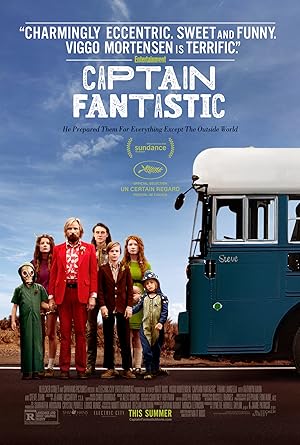How Captain Fantastic Challenges the Modern Society with a Radical Family
Dunia Film - How Captain Fantastic Challenges the Modern Society with a Radical Family. Have you ever wondered what it would be like to live off the grid, away from the consumerism, materialism, and conformity of the modern society?
That is the premise of Captain Fantastic, a 2016 film written and directed by Matt Ross, starring Viggo Mortensen as Ben Cash, a father of six who raises his children in the wilderness of the Pacific Northwest.
The film explores the clash between his unconventional lifestyle and the mainstream culture, as well as the challenges and consequences of his parenting choices.
Plot Summary
The film begins with Ben's oldest son, Bodevan (George MacKay), killing a deer as part of his rite of passage into manhood. We learn that Ben and his wife, Leslie (Trin Miller), have decided to homeschool their children and teach them survival skills, physical fitness, and critical thinking.
They also celebrate Noam Chomsky Day instead of Christmas, and reject organized religion and capitalism. However, their idyllic existence is shattered when Ben receives the news that Leslie, who suffers from bipolar disorder, has committed suicide in a hospital.
Her parents, who blame Ben for her death, forbid him and his children from attending her funeral. Ben decides to defy their wishes and take his family on a road trip to New Mexico, where they encounter various aspects of the society they have been isolated from, such as supermarkets, trailer parks, and suburban family dinners.
Along the way, Ben's children start to question his authority and his worldview, especially Bodevan, who secretly applies to and gets accepted by several Ivy League colleges, and Rellian (Nicholas Hamilton), who blames Ben for his mother's death. The film reaches its climax when Ben and his children attempt to rescue Leslie's body from a traditional Christian burial and give her a Buddhist cremation ceremony, as she had wanted.
This leads to a confrontation with Leslie's father, Jack (Frank Langella), who threatens to take custody of the children. Ben realizes that he may have gone too far in his quest to raise his children differently, and agrees to let them stay with their grandparents.
However, the children, who have grown to love and respect their father, decide to return to him and continue their unconventional life, albeit with some modifications.
Themes and Analysis
Captain Fantastic is a film that raises many questions about the nature of parenting, education, and society. It portrays Ben as a caring but dictatorial, idealistic but often blind, and fascinating but flawed character, who tries to do what he thinks is best for his children, but also imposes his own beliefs and values on them.
He wants them to be independent and critical thinkers, but he also expects them to obey him and share his opinions. He wants them to be free from the influences of the mainstream culture, but he also deprives them of the opportunities and experiences that it offers. He wants them to be happy, but he also exposes them to danger and trauma.
The film does not take a clear stance on whether Ben's parenting style is right or wrong, but rather shows the pros and cons of both his and the society's approaches. On one hand, Ben's children are remarkably intelligent, knowledgeable, skilled, and healthy, compared to their peers who are depicted as ignorant, obese, and addicted to technology.
They also have a strong bond with each other and their father, and a sense of adventure and curiosity. On the other hand, Ben's children are also socially awkward, naive, and rebellious, and lack the emotional and practical skills to cope with the real world. They also miss their mother and crave for normalcy and stability.
The film also challenges the audience to reflect on their own assumptions and values, and to consider the alternatives and possibilities that exist beyond the conventional norms and expectations. It invites us to question what it means to be a good parent, a good child, a good citizen, and a good person, and to recognize the diversity and complexity of human choices and experiences.
Conclusion
Captain Fantastic is a film that offers a thrilling and poignant story of a radical family that defies the modern society. It features an outstanding performance by Viggo Mortensen, who brings depth and nuance to his character, and a talented cast of young actors who play his children.
It is a film that entertains, enlightens, and inspires, and that makes us think about our own lives and values. It is a film that deserves to be seen and discussed.
Open References Source
- Montasefilm.com | Captain Fantastic - https://montasefilm.com/captain-fantastic


